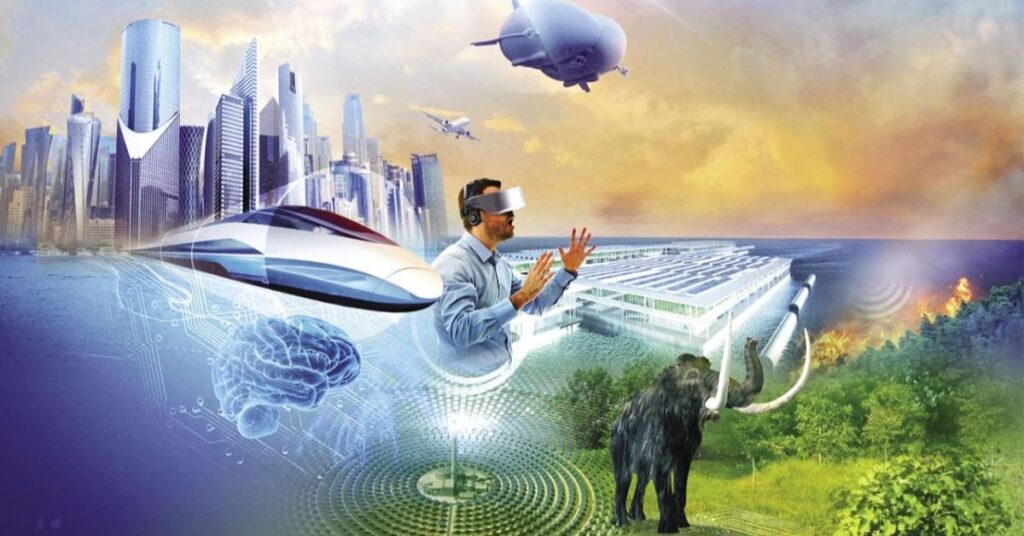Technology is not just transforming how people live—it’s reshaping how societies think, interact, and evolve. From artificial intelligence and automation to virtual reality and biotechnology, the pace of innovation is breathtaking. But while technology continues to change the world, there’s a deeper question that humanity must ask: how should the world change technology? The answer lies in finding balance—between innovation and ethics, efficiency and empathy, and progress and privacy.
The story of technological change is no longer about gadgets or apps. It’s about how digital systems influence the economy, politics, education, and even the human mind. This article explores the Promises and Pitfalls of Technology, how Politics and Privacy are being reshaped, and how Private-Sector Influence and Big Tech are defining global power structures. It also dives into State Competition and Conflict, ending with a thoughtful reflection on how humanity can shape technology for good.
Promises and Pitfalls of Technology
The promises of modern technology are powerful and inspiring. Artificial Intelligence (AI) now helps doctors diagnose diseases faster and more accurately than ever before. Renewable energy systems, supported by smart grids, are making American homes more efficient and sustainable. In classrooms, digital learning tools personalize lessons for students, allowing each one to learn at their own pace. For businesses, automation reduces repetitive tasks and increases overall productivity. According to a 2025 report from Pew Research Center, nearly 80% of U.S. companies already use AI-driven decision-making tools in at least one department—a clear sign of how deeply digital innovation shapes everyday operations.
However, the pitfalls of technology are just as real. Automation may increase efficiency, but it also threatens millions of jobs that rely on manual labor and routine work. Social isolation is growing as more people connect online instead of through face-to-face relationships. Misinformation, cyberbullying, and data breaches have created widespread digital anxiety. A 2024 survey by the Brookings Institution revealed that 61% of American adults worry about AI bias, privacy violations, and data misuse. These issues remind us that while technology can empower society, it can also manipulate it—depending on who holds control and how it’s used.
When we think about how technology is changing the world, and how the world should change technology, the challenge in the U.S. becomes clear: how to keep innovation human-centered. The answer lies in building stronger digital literacy programs, creating ethical frameworks for AI, and ensuring that transparency drives every technological decision. The future will belong to societies that balance innovation with empathy—those that embrace progress without forgetting the people behind the screens.
Politics and Privacy
In today’s digital age, Politics and Privacy are more connected than ever before. Modern political campaigns no longer depend only on speeches or rallies; they thrive on data analytics, social media algorithms, and targeted digital ads. During the 2024 U.S. election, the record-breaking use of AI-generated campaign materials raised serious questions about authenticity, manipulation, and transparency. Platforms like X (formerly Twitter) and Facebook now play a massive role in shaping public opinion by deciding what content users see first—a kind of invisible influence that reaches millions daily.
At the same time, privacy has become one of the world’s most precious yet most violated rights. Every click, purchase, or location ping leaves behind data trails that can be analyzed, stored, or even sold. The California Consumer Privacy Act (CCPA) gives Americans more control over how companies use their information, but true protection is still hard to guarantee in an interconnected global system. Governments often justify surveillance for national security, yet that same surveillance can quietly erode personal freedom.
A clear example lies in the growing use of facial recognition in U.S. cities. While it helps law enforcement catch criminals, it also monitors ordinary citizens without explicit consent. As society moves deeper into the digital age, the real debate isn’t whether technology should monitor—but how far it should go. The future of digital democracy depends on transparency, accountability, and strong ethical laws that protect citizens while allowing innovation to thrive.
Private-Sector Influence and Big Tech
When people think about technological power, their minds often go straight to Big Tech—the private giants that define how technology is changing the world in the 21st century. Companies like Google, Apple, Microsoft, Meta, and Amazon dominate global communication, shopping, and education systems. Their algorithms influence what news people read, what products they buy, and how long they spend online. This Private-Sector Influence shows how deeply corporate innovation shapes everyday life in America and beyond.
According to a 2025 Harvard Business Review report, more than 60% of global internet traffic passes through platforms owned by just five U.S. tech firms. This level of concentration raises a vital question central to today’s debate—How Is Technology Changing the World, and How Should the World Change Technology? Should a few corporations decide how billions of users access information? Should they collect unlimited amounts of data without user consent?
In the United States, policymakers are rethinking digital governance to ensure technology benefits society rather than exploits it. The push for antitrust reform, AI transparency, and ethical regulation continues to grow stronger. Many experts argue that while Big Tech’s innovation has undeniably improved life, it has also concentrated too much power in too few hands.
Ultimately, How Is Technology Changing the World, and How Should the World Change Technology? is not just a question—it’s a challenge for the modern era. The world must redefine how Big Tech operates, enforcing ethical business models, data protection laws, and consumer rights that put people before profit.
State Competition and Conflict
Technology has become the new battlefield for power and influence. The race between the U.S., China, and Europe in areas like artificial intelligence, 5G networks, and quantum computing defines modern geopolitics. This State Competition and Conflict extends beyond trade wars; it’s about who controls the next generation of innovation.
In 2025, the U.S. Department of Defense reported that cyberattacks targeting American infrastructure increased by 38% in just one year. Nations now engage in cyber espionage, data theft, and digital sabotage instead of traditional warfare. For example, ransomware attacks on hospitals and banks show how deeply dependent societies have become on digital security.
To manage this, global cooperation is crucial. Organizations such as the World Economic Forum and United Nations are promoting international agreements on responsible AI use and cybersecurity norms. If the world fails to align on ethical digital standards, technology could divide nations rather than unite them. The key is collaboration—building technology that promotes peace instead of power.
Author Biography
This article is written by a passionate technology writer who specializes in digital transformation, ethical AI, and innovation trends shaping the United States. With years of experience exploring how emerging tools reshape industries, the author bridges academic research with real-world examples to reveal the human side of technology. Their work often answers deeper questions such as how is technology changing the world, and how should the world change technology, helping readers understand how progress can align with ethics, privacy, and purpose. Through a clear and approachable writing style, the author aims to make complex digital ideas simple, relatable, and meaningful for everyday readers.
References
The following reputable sources were used to ensure factual accuracy and credibility:
| Source | Focus Area |
| Pew Research Center | Social and technological impact research |
| Brookings Institution | AI ethics and data privacy |
| Harvard Business Review | Business and innovation analysis |
| World Economic Forum | Global technology trends |
| MIT Technology Review | Emerging tech developments |
Each of these organizations provides evidence-based insights that help readers understand both the promises and pitfalls of technology in today’s digital era.
May Also Read: 12 Futuristic Features Coming Soon To Smartphones
Conclusion
The question “How Is Technology Changing the World, and How Should the World Change Technology? Free” is more than academic—it’s existential. Technology is shaping every corner of life, but it must be guided by human values, empathy, and responsibility. The U.S., as a global leader in innovation, has the opportunity to model ethical progress by focusing on privacy, fairness, and transparency.
As we move deeper into the digital century, one truth stands out: technology reflects the society that creates it. When humans prioritize wisdom over speed and compassion over profit, innovation becomes a tool for collective growth. The world doesn’t just need smarter machines—it needs smarter choices. The future, therefore, depends not only on how technology changes the world, but on how boldly the world decides to change technology.

Jake Miller is a mobile troubleshooting specialist with 7+ years of experience solving Android and app-related issues. He tests every fix on real devices to ensure accuracy and reliability. Jake creates simple, step-by-step guides to help users quickly resolve everyday smartphone problems.



